
|
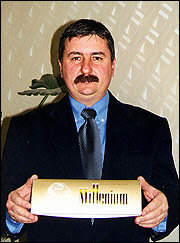
|

 TUTUNUL ROMANESC TUTUNUL ROMANESC |
THE NATIONAL COMPANY
"ROMANIAN TOBACCO" S.A.
Mr. Danut Marcel Cornea,
Director General
Contact:
TUTUNUL ROMANESC, S.A.
Regiei Boulevard, no.2, sector 6
Bucharest - ROMANIA
Tel: 40 (01) 637 44 43 / 40 (01) 312 20 15
Fax: 40 (01) 637 45 26 / 40 (01) 312 10 76
|
 THE TOBACCO INDUSTRY IN ROMANIA THE TOBACCO INDUSTRY IN ROMANIA |
Nowadays the estimated number of permanent smokers around the world is 1,1 billion, i.e., a quarter of the world's present population.
This widespread cigarette consumption determines the economy of tobacco and cigarette producing countries. The importance of tobacco cultivation and its industrialization should not be underestimated
From this point of view the tobacco industry in Romania enjoys a number of advantages:
The favorable climatic conditions for the cultivation of the basic blends (Virginia, Burley, Oriental, Semi-oriental) that go into almost all cigarette types (large consumption, American blend, Oriental or Virginia).
The Romanian cigarette market is the second largest one in Eastern Europe, only after Poland, with an annual consumption of approximately 43.000 tons of cigarettes.
The quantitative consumption trend in the past few years has been maintained at a constant. The American blend of cigarettes has grown
Anti-tobacco regulations, including the ones regarding advertising, are gentler than in most Western countries.
Since 1994, private tobacco companies have not stopped appearing in the market, and their growth and development have been constant. All this despite the past years constant changes in legislation regarding taxes on tobacco products, considered a big hindrance. The most important internal competitors of N.C.T.R.-S.A. (Tutunul Romanesc) are, for the moment, British-American Tobacco, JTI (former RJ Reynolds), Philip Morris and Papastratos.
 SHORT HISTORY SHORT HISTORY |
Documents and chronicles certify the presence of tobacco and smoking habits within the Romanian territory since the second part of the XVI century. The following centuries experienced a very successful tobacco trade among the three Romanian countries.
After the unification of the Moldavian Principality with Tara Romaneasca, tobacco cultivation experienced such growth that the ruler A1.I.Cuza signed in 1864 a law "regarding the establishment of the tobacco monopoly". In the period 1872-1879 this was commissioned to a foreign company and, since 1879 its administration was transferred to the State Monopolies Administration (RMS). In 1929 it was replaced by the Autonomy House of the Romanian Kingdom Monopolies (CAM) that ruled and organized this sector until 1950. During the following period the tobacco cultivation and industrialization have been directly coordinated by the Agricultural and Food Industry Ministry and since 1972 by the Tobacco Industrialization Center (CIT).
Through the Government Decision no. 1214/1990, CIT was reorganized by the establishment of the Autonomy Administration of Tobacco in Romania functioning under this name until 1997.
 TUTUNUL'S MAIN ACTIVITIES TUTUNUL'S MAIN ACTIVITIES |
The National Company TUTUNUL ROMANESC, S.A. was established by the Governmental Decision no.918/12.29.1997. that reorganized the Autonomy Administration of Tobacco in Romania. Under that Decision, TUTUNUL has only state capital and is under the direct subordination of The Agriculture and Food Ministry which, through its representatives, has all the rights and obligations of the only shareholder.
The company's statute was approved by the Governmental Decision no.918/12.29.1997. It stipulates its main activities as follow:
Contracting, purchasing and manufacturing of tobacco of all categories from farmers in the country.
Tobacco cultivation on the company's own estates that have been taken on concession or in association with the landowners.
Tobacco storage and industrialization.
Production and commercialization of blends and additives for cigarette manufacture or other uses.
Manufacturing cigarettes or other tobacco products.
Production and commercialization of seeds for the tobacco blends grown in Romania.
Commercialization of cigarettes and tobacco products from the factories' storehouses or though the companies own stores.
Production and commercialization of machinery, utilities and spare parts.
Research on all aspects connected with tobacco cultivation and industrialization, and with the cigarette and tobacco production and commercialization.
Import-export activities and cooperation regarding tobacco, tobacco products, raw materials and auxiliaries, spare parts, machines and installations needed in the tobacco industry.
Auto transport services, medical assistance of any kind, including dentists, public food and tourism.
Bulk and detail trade with food and non-food products.
 BRANCHES AND LOCATION BRANCHES AND LOCATION |

The company has in its structure 10 branches without juridical personality:
Bucharest Cigarette Factory, Regiei Boulevard no.2, sector 6
Cigarette Factory Sfantu Gheorghe, Kos Karoly St. no.21-23, Covasna
Cigarette Factory Timisoara, Pop de Basesti St. no.2, Timis
Cigarette Factory Ramnicu Sarat, Puiesti St. no. 19, Buzau
Tobacco Fermenting Factory Arad, Petru Rares St. no.3, Arad
Tobacco Fermenting Factory Barlad, Trestiana St. no.10, Vaslui
Tobacco Fermenting Factory Craiova, Brazda lui Novac St. no.215, Dolj
Tobacco Fermenting Factory Titu, 16 Februarie St. no.10, Dambovita
There are also two technological research laboratories (for tobacco cultivation and cigarette production) as well as a department for spare parts and auxiliary materials.
Headquarters are in Bucharest (Regiei Boulevard no.2, sector 6). The territorial dispersion of the branches allows the coverage of the most important regions where tobacco is grown in Romania and the presence of the cigarettes produced by the N.C.T.R.- .S.A. in all cities.
 THE BUSINESS THE BUSINESS |
The number of workers in the Tobacco Company today is approximately 3.500 employees. Around 70% of them are qualified workers directly in charge of production and the majority of the employees are part of Romtabac Trade Syndicate.
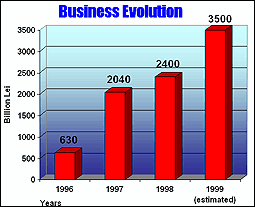
The Company has today a social capital of 493 billion Lei and owns 1031,7 billion lei of capitals. The evolution of the business figures for the last three years was as follows:
The Company has stayed profitable every year taking part in a significant proportion (between 2-4%) to the State Budget income, a reason for which it is considered of national interest.
The preliminary financial results of the year 1999 are higher to those of 1998 despite the difficult situation of the Romanian economy, demonstrating a large adaptability and flexibility of the management. |
Yearly cigarette production is situated between 18.000-20.000 tons, representing between 42-47% of the cigarette market in Romania in terms of quantity and 25-30% in terms of value.
The Company carries out the entire fermented tobacco production in Romania, estimated in 1999 to be around 10,700 tones. TUTUNUL has contracts with more than 46.000 farmer families to whom it ensures the seeds for free, as well as the fertilizers, pesticides and other materials for planting and the technical assistance for the entire crop.
 THE MAIN CHARACTERISTICS OF TUTUNUL ( N.C.T.R.-S.A.) PRODUCTS THE MAIN CHARACTERISTICS OF TUTUNUL ( N.C.T.R.-S.A.) PRODUCTS |
The N.C.T.R.-S.A. products are divided into two big categories:
- Cigarettes (tobacco products) registered as trademarks belonging exclusively to the company.
- Fermented tobacco obtained from seeds standardized by N.C.T.R.-S.A.
 Cigarettes Cigarettes |
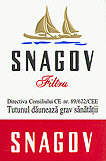
N.C.T.R.-S.A. has on its annual list around 49 cigarette brands. The most representative of which are the Snagov and Carpati brands representing 75% from the total sales.
To counteract the negative effect of the brands' aging, since 1994 a series of new cigarette brands with filter was introduced. These brands (Coloana, Record, Snagov International, Filter Carpati, Vis, Timisoara, Bucuresti, etc.) have been well accepted by the public They are presented as full flavor, lights, menthol and with a superior presentation (in cardboard packs in cartons).
In 1999 the brands renewal continued being exclusively oriented towards the filtered cigarettes market segment. Many smokers prefer this type regardless of the cigarettes without filter and the large competition of foreign brands. Thus, to continue in that line and as a big step both in design and quality the Millenium king-size cigarette, gold and silver, was created, addressed to the more exciting and sophisticated third Millenium consumers.
The 6 cigarette factories have been technically improved (70% upgraded) and through the utilization of superior materials and tobaccos, N.C.T.R.-S.A. succeeded to improve the quality/price ratio of its own brands, especially for filter cigarettes. The consumers' reaction was prompt, the filter cigarette weight in total sales raised for the last year from 20% to 34%.
The cigarette manufacturing cycle is very short (3 days). This determines a high production, delivery and cash rhythm.
Since 1995 until today, NC.T.R.- S.A. has invested from its own resources or from other resources (credits with and without state guarantee) circa USD 100 million into new technology for its cigarette factories. During the first semester of the year 2000, when this program finishes, N.C.T.R.-S.A. will be situated at a medium international level and at the same level with its main local competitors (Philip Morris, British-American Tobacco, Japan Tobacco International).
N.C.T.R.-S.A. is an integrated company insuring 60% of its raw material needs of fermented tobacco through contracts with farmers. Fermented tobacco is also kept in storehouses where there is permanently an important stock that covers the needs for at least 7-8 months and that represents last year's crop. To improve cigarette quality and to complete the rest of its needs, N.C.T.R.-S.A. annually imports between 6,000-7,000 tones of tobacco, generally from the EU.
To insure the materials that are mostly imported from well known foreign companies annual contracts are divided monthly or by semesters.
N.C.T.R.-S.A.'s main advantage on the cigarette market is its quality/price ratio for consumers who are particularly sensitive towards the influence of this factor.
A great importance is given to the company's marketing policy, oriented towards the improvement of distribution.
 Fermented tobacco Fermented tobacco |
N.C.T.R.-S.A. has contacts with farmers to insure its crops. They are done annually or for longer periods (up to 3 years).
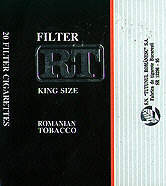
The manufacture and payment of crops is done in a relative short period (October - January). For this reason the company faces an important financial effort taking into consideration that tobacco is manufactured and capitalized in the cigarette production during the whole year. Tobacco storing and financing are both executed with its own resources and short term credits (6 months-1 year).
The price of tobacco and the facilities given for free or in advance to the farmers are established by N.C.T.R.-S.A. The reason is to stimulate both production and quality, especially since this crop does not benefit of any of the subventions or advantages that enjoy EU countries.
N.C.T.R.-S.A. has created through its years of existence, and under different types of organization, a vast net of agencies and branches for the cultivation of tobacco. It has specialized personnel who covers all favorable growth regions. The following blends are cultivated:
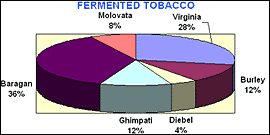
 SUPPLIERS SUPPLIERS |
The import of tobacco is done from the largest specialized dealers in the world such as Dimon from Holland, Michailidis from Greece, Tabak Sud from Switzerland or Euroleaf, as well as from Romanian intermediaries.
The cardboard of the packet is produced in Romanian printing houses and has a good quality level. All other auxiliary materials and ingredients are imported based on a very clear contractual relationship with the biggest manufacturers in the field.
The main suppliers that have developed for years businesses with N.C.T.R.-S.A. are:
Cartiera Rossi
Julius Glatz
Cartiera del Maglio
Folial
Rhodia
Alcan Deutschland |
ITALY
GERMANY
ITALY
AUSTRIA
GERMANY
GERMANY |
 CLIENTS CLIENTS |
Through the years N.T.C.R.- S.A. has developed a distribution network formed of business partners specialized in the cigarette trade that covers all the capital, Bucharest, and all regions in the country.
Nowadays, N.T.C.R.- S.A. has 26 regional dealers that have engaged the entire cigarette production for 1999 from all 6 cigarette factories.
All dealers have the material and financial capacity for cigarette distribution, being selected based on these criteria. Based on their performance, dealers benefit of stimulating discounts. Distribution contracts are divided into daily, every 10 days and monthly in order to maintain the optimal cigarette stock and to obtain the best level of the structure. |
|
© World INvestment NEws, 2000.
This is the electronic edition of the special country report on Romania published in Forbes Global.
July 24th 2000 Issue.
Developed by AgenciaE.Tv |
|
|
|
| |
|
|
|
|

